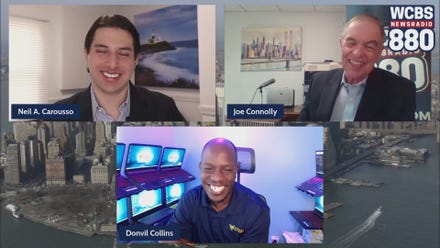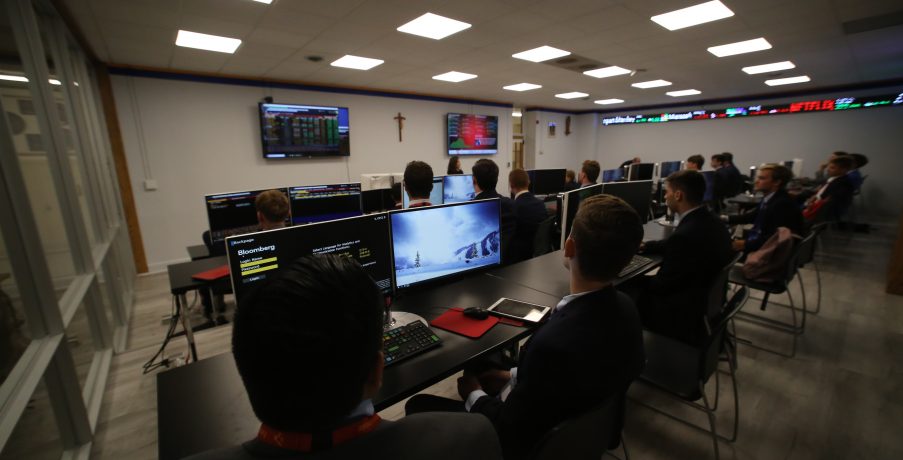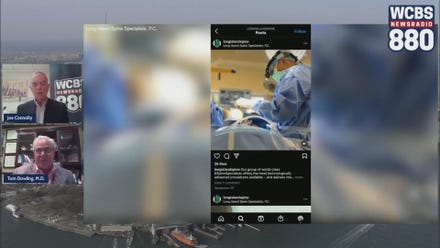-
How to Create ‘FOMO’ in Virtual Events to Grow Sales
Post Views: 721By Joe Connolly and Neil A. Carousso
NEW YORK (WCBS 880) — No one wants to feel left out.
Some businesses have been thriving in the digital space and using virtual events to drive sales. While virtual events allow companies to reach audiences outside their normal radius, combating Zoom fatigue can be the biggest barrier.
VeeKast president and CEO Donvil Collins’ advice: “Find some way to give your viewers 10 seconds of fame.”
He told Joe Connolly and Neil A. Carousso on the WCBS Small Business Spotlight, sponsored by Dime Community Bank, that people on the other end of the computer need to feel like they are part of an experience. It won’t be successful if it’s one-way communication.
“Especially thinking about the chat, can people respond? Are people in the broadcast able to respond to the people that are watching?”
One of VeeKast’s clients, Collins said, had been drawing about 400 people for in-person events pre-pandemic. It had a live audience of 2,000 people online and they got more than 6,000 views of its event on-demand.
“Really part of what they did was creating what I like to call ‘FOMO,'” he said of the acronym that stands for “Fear of missing out.”
“That’s one of the big things that organizations are missing sometimes and not only getting people to watch it live and not feel like they’re just watching, they’re actually a part of this event. It’s not a production, it’s an event,” Collins explained, continuing, “And then for the replay, it’s ‘What did you miss? What’s the big deal?’ So I think FOMO is a big part of driving engagement, views, and all of that.”
VeeKast was founded in 2013 as an in-person events and video production company based in White Plains, NY. Collins made commercials and other advertising while also producing some livestreaming events. By focusing on virtual events during the pandemic, Collins said they doubled their business both in 2020 and 2021 from the year prior.
“Our goal for this year is we’re just going to push it and try to triple the business,” he said. “At least from what we’re seeing in an increase, there’s a lot of opportunity there because there’s so much need for help. People want to get this stuff done, but they don’t really know how, and they just need a single mind or a managerial company or someone that can come in with all the gear and actually help them do it well.”
VeeKast prides itself on producing virtual events that look like the Academy Awards with overlay designs and professional audio/video equipment they supply as part of a “remote broadcast kit.”
“We send a lavalier mic, we also send tripods and we send them a link that we can control the camera equipment remotely,” said Collins.
“From your offices in Westchester, you’re running a whole TV network like a control room now,” noted Connolly.
“There’s some that was (sic) international locations in Europe and other places and we are controlling the gear that is there so we can get the quality of the recording to be better.”
See ways businesses are leveraging broadcast quality virtual events to grow sales on the WCBS Small Business Spotlight video above.
-
Decision Makers Exclusive: Marriott President Says ‘Bleisure’ is the Future of Travel
In Best Of, Featured, Guest, Interview, Latest, News Stories, Technology, The World, Top News, videosPost Views: 1,726Produced by Neil A. Carousso
NEW YORK (Bloomberg/1010 WINS) — While travel lovers may still have the COVID-19 pandemic blues, one hospitality industry leader recently joined 1010 WINS and Bloomberg to explain why the future of travel looks bright as we head into 2022.
Marriott International President Stephanie Linnartz told hosts Carol Massar and Larry Mullins in an exclusive Bloomberg/1010 WINS Decision Makers interview that “Bleisure,” or mixing business and leisure travel, is poised to be the future of the industry.
“I’m more bullish about the future of travel and my company than I’ve ever been,” she said.
Near the start of the pandemic in April 2020, Marriott – a hospitality company that operated 2,149 properties as of the end of last year, including JW Marriott, The Ritz-Carlton, St. Regis and W Hotels – saw business drop by 90 percent. Lockdowns and travel restrictions severely curtailed travel around the globe.
Since most of the company’s employees work on-site, around 80 percent were furloughed, laid off or lost their jobs when the pandemic hit and 25 percent of Marriott’s hotels were closed.
“It was really the most unprecedented, devastating event to ever hit our industry and other related industries,” said Linnartz, who has been with the company for 24 years.
However, she said the company worked quickly and creatively to adapt. When travel was restricted, this often meant entering the Marriott Bonvoy brand into partnerships with companies such as UberEats.
Now that travel has opened up more, Linnartz said she can see people eager to hit the road more than ever.
“We have really entered into a phase of recovery in the travel business,” Linnartz told WINS and Bloomberg. “I really think that travel is part of the human condition,” she added.
With the pandemic, the hotel experience has also changed, Linnartz said. Heightened cleanliness procedures and more features, such as check ins and room service, are offered via mobile devices.
“That’s something I think that’s going to stick,” said Linnartz of the technological advances spurred by COVID-19. Yet, she said it won’t replace the “human element” necessary to make travel great.
Going forward, the company is also planning to focus on some initiatives launched before the pandemic: becoming more environmentally friendly as well as offering high-end rental properties and yachts.
In 2019, Marriott International announced it would replace single-use toiletry bottles of shampoo, conditioner and bath gel in guestroom showers with larger, pump-topped bottles to reduce landfill waste. As of that August, the larger bottles were already in use at around 1,000 North American properties.
Another project from 2019 is the Marriott rental property program. Unlike other similar services offered by companies like Airbnb, Marriot properties are only premium or luxury, with high standards for amenities. Since the program started, offerings have grown from 2,000 properties to around 50,000.
“Things are moving in the right direction,” she said. “Travel is coming back in a major way.”
A remaining challenge for the industry has been finding staff amid a labor shortage, but Linnartz said Marriot’s commitment to a solid work culture and offering opportunities for advancement has helped prevent high turnover.
“Our culture at Marriott has always been our secret sauce,” she said.
“When you had a job at a place like that, you know, you were big stuff in the neighborhood you had a pride in doing that,” said Mullins, reminiscing about his time as a Marriott employee in Orlando, Fla.
As Marriott continues to look for ways to make work experiences for its associates positive and shaped to today’s challenges, Linnartz can also see how new, flexible work schedules in other industries are impacting the travel business.
“Bleisure,” is growing because people can work remote and take longer vacations, she explained.
Another challenge for the travel industry is the recent surge in omicron variant COVID-19 cases, which has set off mask mandates in the U.S. as well as some international travel restrictions.
Now that Marriott has weathered one part of the pandemic storm, Linnartz has high hopes for the future.
“From crisis comes creativity,” she said.
Decision Makers is a joint production from Bloomberg and Audacy – the parent company of 1010 WINS. It is produced by Neil A. Carousso.
-
Long Island High School Prepares Students for Life and Business through Personal Finance Course
Post Views: 1,046By Joe Connolly and Neil A. Carousso
MINEOLA, NY (WCBS 880) — A private high school on Long Island is teaching financial responsibility – a real-world skill people often learn on their own.
Chaminade High School in Mineola requires a two-year financial literacy course for juniors and seniors. The class aims to prevent students from forming bad habits at a young age.
“I think for many of us, we learned how money works just by making the mistakes along the way and making those first decisions on our own,” said Chaminade president Brother Thomas Cleary who implemented the curriculum after Bloomberg proposed the idea in 2014. The financial firm sponsors the course and the school’s business center.
“We really want to empower our young men here to have the knowledge of how their money works before they actually have to press that button and put it into action,” he said.
A number of business leaders, including Federal Reserve Chairman Jerome Powell, have said they wish they had been able to take a finance class in high school. Bro. Thomas told WCBS 880 he would connect anyone interested in starting a financial literacy course at their school with Chaminade’s representative at Bloomberg.
Joe Connolly and Neil A. Carousso look at how sound financial principles apply to running a business on the WCBS Small Business Spotlight, sponsored by Dime Community Bank. Entrepreneurship can lead people down a path to financial freedom, but operating a business well requires financial discipline, as Chaminade’s class addresses.
“We have a number of young men, who are still in college, who’ve started their own businesses and have said that this financial literacy course really helped them navigate the ups and downs of starting a business while a college-aged student,” Bro. Thomas said. “We’re seeing in real-time the benefits of this course, and I think over the long-term, the benefits of our young men going into the business world with a solid understanding of how money works and how to make it work better for themselves and for our society is a win-win for everybody.”
The class focuses on saving for retirement, investing and avoiding credit card debt. Students at the all-boys Catholic high school also learn about the benefits of different types of investment accounts, including Roth IRAs and 401(k)s, and partake in a stock market competition in which the teens begin with a faux balance of $1 million to purchase stocks.
“You walk in the hallway, you’ll see kids checking on their iPad what their investment is doing that day and where it’s going,” the school president said of the enthusiasm he has witnessed first-hand. “These are 17, 18 year old kids who are really interested and that’s how the teachers keep them really interested in the course.”
The students monitor their portfolios through the semester with a close eye on movements in the market in real-time. The course’s instructors are experienced Wall Street professionals who bring their real-world experience into the classroom to relate how macro decisions affect people on a personal level.
“You know, where the market goes, it affects not only interest rates but how that affects mortgage loans and credit card debt and just the economy globally,” noted Bro. Thomas. “I’ve seen the instructors take one really minute detail in the news that day – you know, why did the stock go up or down – and they just show the ripple affect across the globe in so many different sectors.”
He told Connolly and Carousso that Chaminade’s objective is to provide a financial toolkit and a foundation students can build upon in their professional careers and personal lives.
“I got one email recently saying that his course at Chaminade was probably one of the most influential courses he had in terms of helping him decide what he wanted to study and where his passion was,” Bro. Thomas said.
See ideas on how to teach your kids about financial responsibility and get book recommendations for the holidays to make learning fun and engaging on the Small Business Spotlight video above.
-
The New Age Word-of-Mouth Marketing
Post Views: 902By Joe Connolly and Neil A. Carousso
NEW YORK (WCBS 880) — Word-of-mouth can still be the most effective marketing for businesses.
Long Island Spine Specialists, P.C. discovered this when they were forced to find new patients on their own. The rapid consolidation of hospitals and physicians in recent years have left non-affiliated practices to develop their own marketing.
“Our referral patterns dried up in terms of private practice doctors,” said Dr. Thomas Dowling, founding partner of Long Island Spine Specialists. “I’d say less than 50 percent now of physicians are in private practice where the rest are employed and there’s some financial reward or incentive to stay in a system rather than refer outside a system.”
He told Joe Connolly on the WCBS Small Business Spotlight, sponsored by Dime Community Bank, that, like many businesses today, the practice uses reviews and client testimonials on its website to find new patients.
“What our practice has now noted is that word-of-mouth and your reputation now is more of how we get patients than actual physician referral; although, those are still out there as well,” said Dr. Dowling.
Long Island Spine Specialists keeps its servers in-house and has a full-time IT staff to manage its website security.
Dr. Dowling has been in practice for more than 30 years. Since then, the health care industry and his field of medicine has changed drastically.
“When I started, there was very little technology available in terms of instrumentation,” he said, noting there were few advancements between the 1960s and 1980s when he earned his certifications.
The hallmark of any entrepreneur, Dr. Dowling saw an opportunity to help people where there was a void for both surgical and non-surgical solutions.
“There’s some modifications but very few back then and there was a lot of opportunity to develop better techniques for surgery,” he said.
Robotics and stem cell procedures are used more commonly to treat herniated discs with a shorter recovery time, according to the surgeon.
“The navigation, basically, like your car or GPS, (is) a guided way to enter the spine as we’ve gone from open surgery where we actually see the anatomy to going through minimally invasive through smaller incisions or percutaneously, meaning not even making a real incision, we need special interoperative guidance to help us make sure that we’re in the right spot,” said Dr. Dowling.
The spinal surgery industry today is booming. It’s valued at $9.35 billion, and by some economic forecasts, the industry will reach $13.8 billion by 2025.
Long Island Spine Specialists has a small piece of the pie with four locations across Nassau and Suffolk Counties. The practice is made up of a team of board-certified orthopedic surgeons who have sub-specialties in spine surgery. Dr. Dowling told WCBS 880, though, most of their patients can avoid surgery.
“We have a lot of patients who present with neck pain, shoulder pain, back pain, hip pain, and sometimes, they’re doubly blessed. They have a shoulder problem then a neck problem, they have a back problem or hip problem, or really, their hip pain manifests itself as back pain and vice versa,” he said, continuing, “So, there are people I’ve seen who had hip replacements wondering why they never got better; it was really their back.”
Dr. Dowling said the field has grown as people incur back problems from poor posture and long hours hunched over a computer.
“The most common reason people go to the doctor is for a cold,” he said. “The second most common reason is for back pain.”
See more on marketing and running a medical practice on the Small Business Spotlight video above.
-
Back to Office Exposes Digital Divide between Employers and Employees
Post Views: 763By Joe Connolly and Neil A. Carousso
CONNECTICUT (WCBS 880) — At about 7:30 a.m. on a weekday morning in October, David Lewis is driving to OperationsInc headquarters in Norwalk, CT. He can spot plenty of good parking spaces available at the New Canaan train station.
“You could have found a parking spot up against the train station tracks, themselves, which were coveted spaces that used to fill at 5/5:30 in the morning. That tells me all I need to know about how people still are working remotely and are not making their way into the city,” said Lewis on the WCBS Small Business Spotlight, sponsored by Dime Community Bank.
That’s concerning to the human resources CEO who feels the same way as many of his larger clients: They want workers back in the office.
“I’m ecstatic about the ability to dynamically talk to my employees, bring somebody into a meeting, and have a quick conversation with them about an issue that just came up,” Lewis told Joe Connolly and Neil A. Carousso. “I keep hearing that from our clients that ‘I want to go back to the way that we did it before because that worked best for us.'”
He recognizes, though, that remote work has increased productivity in many areas. One glaring outlier is employee training.
“Training for us was always about the in-person experience – about coming into a training facility, a training room, or a hotel conference center – and being able to get in front of our students and really connect with them – have a discussion versus have a lecture. That’s our secret sauce. But, we’ve had to pivot that since last year to something online,” said Lewis.
To combat so-called “Zoom fatigue,” OperationsInc has made its online training modules shorter. Lewis also admits the world has changed.
“Employees are in control and employers need to understand that,” he said.
Many workers want the flexibility that remote work allows, namely flexible work hours, absence of a commute, and the ability to pick up their kids from school.
Lewis tells his clients to find the right balance or turnover will be extremely high.
Labor issues continue to plague businesses and many prospective employees complain that their online application does not get noticed by a human resources professional.
Lewis told Connolly and Carousso that artificial intelligence has exacerbated a huge problem during the pandemic .
“A lot of companies have invested a lot of money in these applicant tracking systems but don’t know enough about how to change these filtration settings to get the candidates that they’re looking for through the door,” he said.
“They also tend to eliminate a lot of people because they’re not remembering that the settings they have – five years of this or two years of that – have to be regularly adjusted.”Lewis told WCBS 880 another hiring issue at play is that in-person jobs are not as desirable as remote work in the current labor market.
Watch the WCBS Small Business Spotlight video above for more on this story.












